Torture and Traffic Accidents Were Meant to Break the Church—The Dictator Failed
24 years later, Shohrat Piriyev from Turkmenistan still shares the gospel with his people
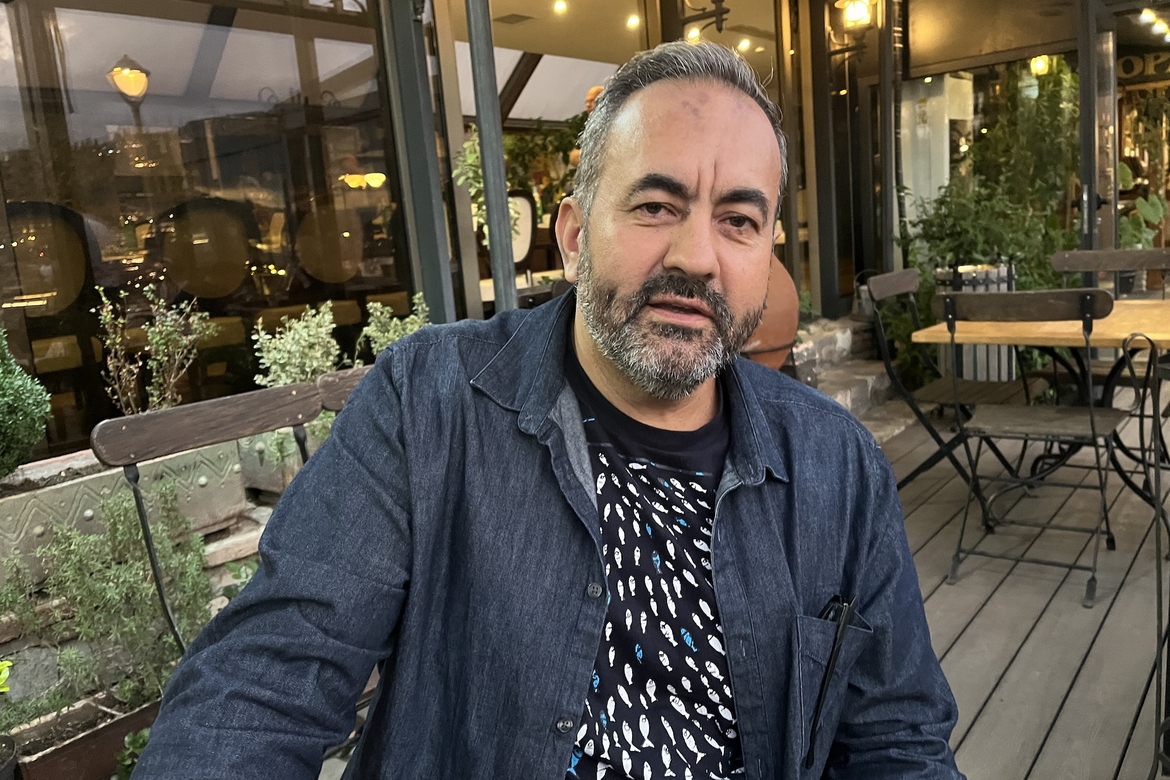
Shohrat Piriyev shares the story of the church's growth, the persecution, the escape, and the ongoing evangelism.
First published on Stefanus.no. Written by: Johannes Morken Photo: Johannes Morken
The family fled for their lives when the dictatorship used torture and staged traffic accidents to break a growing church. 24 years later, Shohrat Piriyev is still sharing the gospel with his people.
October 2001: Three Christian leaders who had been tortured and attempted to be killed in Turkmenistan land at Oslo Airport, Norway, with their families. Six adults and five children are immediately guided onto a flight to the city of Aalesund. In the village of Fosnavaag, three apartments are ready. The dramatic escape has ended in freedom.
– This wouldn't have happened without the efforts of John Victor Selle. He stepped up when we really needed help, says Shohrat Piriyev. Selle was the general secretary of Norwegian Mission to the East (NMØ), now known as Stefanus Alliance.
This is the first time Shohrat Piriyev’s story is being told.
Searching for Meaning, Encountering Jesus
Shohrat and the two other Christian leaders who fled were among the very first to come to faith in Turkmenistan after the country became independent in 1991, the year the Soviet Union collapsed – and mission reached Turkmenistan as well.
Shohrat’s faith journey began in 1985. The 12-year-old was devastated when his mother lost her sight and his uncle died.
– My mother had taught me a bit about Islam. But I couldn't find meaning in religion and became an atheist in my mind, even though I still belonged to Islam, says Shohrat.
He married in 1992, before turning 19. The couple settled in his wife’s village. Her brother, Batyr Nursen, and Shohrat became friends.
– One day, Batyr told me that a family friend had become Christian while studying in Moscow. Now, Batyr had also become Christian. I was shocked and angry and said, “The Christian god is a Russian god.” We didn't speak for three months.
The Jesus Film
In 1994, a Jesus film, produced by Campus Crusade for Christ based on the Gospel of Luke, was brought to Turkmenistan.
– In the film, Jesus spoke my language. God was, therefore, God for Turkmen people too, says Shohrat.
– I found answers to the questions about the meaning of life. I was filled with a peace and joy I had never known. My wife accepted Jesus. I ran back to my own village. My 76-year-old mother accepted Him, as did neighbors, friends, and siblings. I couldn’t stop talking about Jesus. His work of salvation was the greatest miracle of all.
I was filled with a peace and joy I had never known.
Shohrat Piriyev
Promising Lawyer, God's Calling
Shohrat had dreamed of becoming a lawyer, but had not been accepted into law school. He belonged to the lowest of the country’s clans.
– I prayed to Jesus. A miracle happened. I was accepted into the best university, in the capital city of Ashgabat, to study international law.
For four years, he studied alongside the sons of the elite. Shohrat shared the gospel with them as well. He also established a Turkmen fellowship in the Russian church. When he secured a job in a government department early in 1998, his future seemed secure.
– But God asked, “Who will lead my church? Who shall I send?” I had no peace, and I answered, “Send me!”
Shohrat resigned from his job within a year, even though his boss did everything he could to persuade him to stay.
– In one year, 50-60 people were baptized. We spread the Jesus film and recorded audio tapes for those who didn’t have a VCR. I evangelized openly. As a lawyer, I knew what rights we had. The constitution guaranteed full freedom. I believed we were building a democracy that protected our right to believe and share our faith. But I was wrong.
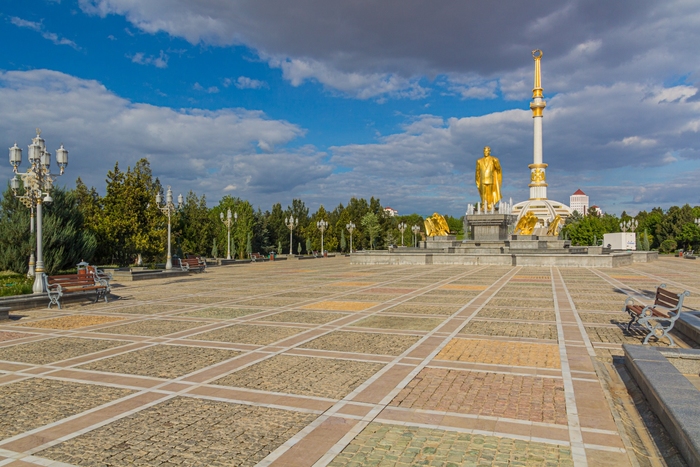
In Ashgabat, the golden statue of Saparmurat Niyazov, dictator from 1991 until his death in 2006, towers prominently. Photo: Shutterstock
KGB Intervention
The secret police, which was known as the KGB in the Soviet era, operated just as it had before. “This wasn’t about Islam seeking political power. It was communists and former communists who continued to run the control apparatus,” Shohrat told general secretary Selle when he visited in September 1999.
Shohrat had been informed by the KGB that anything other than prayer with his own family was illegal, as Selle noted in his report.
The requirement for registering a church was set at a minimum of 20 members in 1991. By 1995, it had been raised to 500. It was about to get worse.
Branded a Traitor
In the summer of 2000, Shohrat was branded a traitor and a leader of a sect in the newspaper Adalat (Justice), he recalls:
– I confronted the journalist: “Why hadn’t you asked me for my side of the story?” The journalist explained that he had received orders from the KGB. I responded that a journalist should never take orders from the KGB.
Shohrat contacted a lawyer to take the newspaper to court.
– But the lawyer warned me: My family and I risked being killed in a traffic accident. I thought that could have happened in Soviet times, but that none of my own people would do something like that. I was wrong again, says Shohrat.
Attempted Murder on the Road
A couple of weeks later, in August, Shohrat and his wife, who was six months pregnant, got into the car with their two young children. They were heading to her village, 60 miles away. A truck came toward them, and the driver swerved the truck into their lane.
– I managed to swerve the car away. We avoided the collision but drove off the road. The car landed on its roof. We climbed out. My wife was bleeding. KGB agents arrived. They let the truck driver go, but arrested me. I was released after a few hours. The KGB handed my wife and children over to passersby who took her to the hospital. But she received no help and lost the baby. It was only much later that she told me the baby was thrown straight into the trash. She took it very hard.
Front Tires Exploded
On November 21, Batyr and three other Christians were on their way back to Ashgabat when both front tires exploded. The car overturned. They crawled out, nearly unharmed, and hitchhiked into the city.
The next day, Shohrat, along with Batyr and another, returned to the scene. There, they were met by seven or eight police officers. They had found videotapes of the Jesus film scattered around the wreckage. The three were arrested and held until the following morning.
Now that the leaders of the “sect” spreading the Jesus film to villages and towns had been identified, the plan was to break them.
Beating and Choking
– We were tortured, beaten with sticks, kicked, dragged by our hair, subjected to choking with a gas mask, and given electric shocks, Shohrat recounts.
– They wanted us to give up our faith and provide information about others. “People like you should be crushed and thrown away. Our country doesn’t need you,” said the man leading the interrogations.
The case drew significant attention outside the country.
– International pressure saved our lives, Shohrat says.
These stories are also told in Stif Magne Hwitmann’s recent book about Batyr: Batyr Nursen – Imprisoned, Tortured, Expelled from Three Countries.
We were tortured, beaten with sticks and kicked.
Shohrat Piriyev
"Significant Tension in the Body"
Unaware of the drama unfolding, the new mission secretary of Norwegian Mission to the East (NMØ), Ingvar Isene, and Arve Kråkenes from The Navigators traveled to Uzbekistan on November 23, 2000, the same day the three men were released from prison.
After conducting meetings in Uzbekistan, they crossed into Turkmenistan on December 2—“with significant tension in their bodies,” Isene noted in a classified report to the board.
Despite “considerable efforts” before departure, they had been unable to contact Shohrat and the others. They had informed them of their arrival and where they would be staying but received no response—except for a coded email that they could not decode.
In Ashgabat, they spent the first day praying—and wondering what to do. From a random number in the city, Kråkenes called a Russian he knew. But the man was clearly afraid: “They are listening to us now. We can’t talk.”
Secret Meeting
Around 8:00 p.m., Shohrat appeared with Batyr and another person. They took the Norwegians from the hotel, ensured no one was following them, and jumped into a car. They drove around until they found a place outside the city. There, Shohrat shared the story of the exploded tires, the Jesus film, and the torture.
Shohrat also revealed that the apartment he had purchased with funds from NMØ, which had granted him the right to live in the capital, had now been confiscated. According to the law, the regime would likely force him back to his home village.
– The KGB put me on the train. My wife and children were thrown out of the apartment. Everything we owned was thrown into the street. I got off the train after a few stations and returned to my family. We were allowed to stay with some Christians. I continued my ministry, Shohrat recalls today.
To Isene and Kråkenes, Shohrat said on December 2, 2000: “We have to take it one day at a time.” He also said, “Jesus spoke about this two thousand years ago, that we would be brought before authorities and interrogated, exactly what we had been through. We were to testify to those who interrogated us, Jesus said. We have done that.”
We were to testify to those who interrogated us, Jesus said. We have done that.
Shorat Piriyev
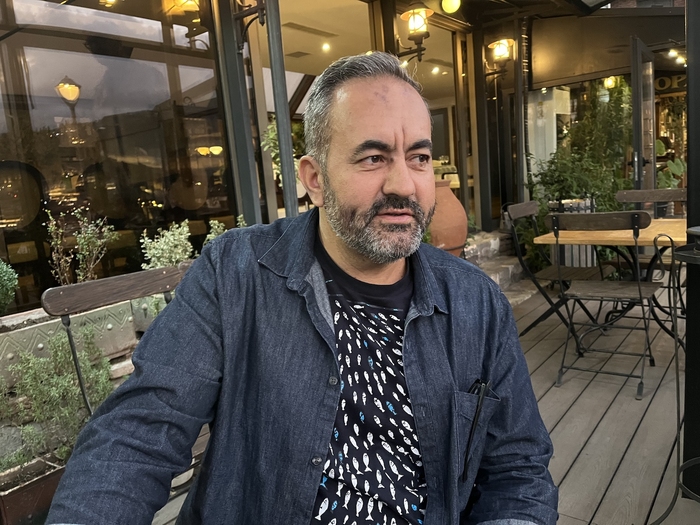
Shohrat Piriyev recounts a clearly orchestrated car accident where his entire family could have been killed.
"Following Orders"
Shohrat had told the man responsible for the torture that "I loved him and had forgiven him for what he did to me on the first day. I told him I was praying for him." But then the man didn't want to hear anymore. He said that he understood we were good people, but that he was just following orders.
The uncertainty was wearing on Shohrat's wife. As for Shohrat, he said, "I will wait on the Lord. I will probably work in a completely different way," he told the Norwegian visitors.
They didn’t risk any further meetings. In the December darkness, they prayed together before parting ways. Shohrat and Batyr believed they could quietly continue their work.
But it would prove impossible.
Dramatic Escape
Early in 2001, Norsk Misjon i Øst learned that Shohrat, Batyr, and another had fled with their families. They made it to Uzbekistan in January. After hiding from the police there for a couple of weeks, they made their way to St. Petersburg, Russia.
"I had to finally cry out to the Lord and ask Him to save us," Shohrat told Isene and Kråkenes when they arrived in St. Petersburg in May 2001. In a report Isene wrote, Shohrat is quoted: "I often accuse myself of not being strong enough. But I could not continue in Turkmenistan."
Great Strain
In St. Petersburg, the refugees had started evangelistic radio programs in Turkmen. But they were without citizenship, holding only "semi-legal" Uzbek passports and Uzbek identities. It was a huge strain, Isene reported. With their dark appearance, they could be suspected of being Muslim terrorists. And soon, one of the women was about to give birth—what nationality would the child have?
In Oslo, a proactive general secretary, John Victor Selle, took the matter to the Ministry of Foreign Affairs (UD). UD contacted the UN's European refugee office in Paris, which then informed the UN office in Russia: the three families had to be granted refugee status.
In October, six adults and five children were transported in diplomatic cars to the airport. In Oslo, they were immediately guided to Fosnavåg, outside Ålesund. Three good apartments were ready. Everything was arranged.
The Pressure—and the Thoughts
But they had lived under immense pressure.
– In Norway, we could finally breathe. When the pressure was over, we began to think. We could have been killed, we could have been caught by the KGB during our escape. I had to ask myself if what I had done was worth the price. We didn’t know if the Christian groups in Turkmenistan would survive, says Shohrat, adding:
– The life we had lived was in ruins. We didn’t get to say goodbye to anyone. When my wife learned after three months in Norway that her father had died, she had a breakdown. She, who had never complained to God, was now angry. God had not healed her father, and she and her brother Batyr couldn’t attend the funeral. She told God she couldn’t take it anymore, says Shohrat.
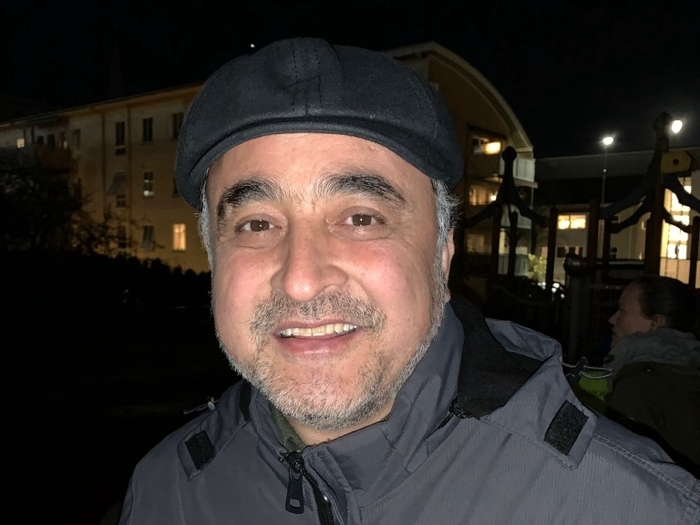
In recent years, Batyr Nursen has participated in several torchlight processions in Norway, sharing his story. Photo: Stefanus Alliance.
Nightmares
Shohrat’s wife had nightmares for a long time about the escape and the traffic accident.
– She still has flashbacks when she encounters large vehicles. Our son was 5 or 6 years old at the time. He had also experienced KGB raids and saw me being arrested. He was afraid every time someone knocked on the door. It took him several years to overcome that.
Shohrat is extremely grateful for the help that brought them to Norway.
– But we were left alone with the trauma. I became more irritable when something happened. I said I was functioning. But the truth is, we had deep trauma. I have seen people who couldn’t cope with the trauma after persecution. Some have lost their faith. A friend of mine got divorced. Today, I know we needed biblically-based counseling.
I have seen people who couldn’t cope with the trauma of persecution. Some have even lost their faith.
Shorat Piriyev
A New Hope
Both Shohrat and Batyr continued spreading the gospel to Turkmenistan. A studio was set up in a prayer house, and CDs were sent to Germany for broadcasting. In 2003, they held the first of several conferences in Istanbul, Turkey, for Christian leaders from Turkmenistan.
– Many were uncertain and afraid after the persecution. We met people with no light in their faces, without hope. But after conversations, songs, and prayer, they regained their hope. New people came to faith in Turkmenistan.
In Istanbul, they also met many Turkmen guest workers. The work expanded. A Turkmen church was planted. A resource center was built.
– God had a plan for my life. My education fit perfectly into the plan, as did my English and communication skills.
Joy in Preaching
Shohrat says that in the beginning, immature leaders were recruited for the church in Turkmenistan.
– They were evangelists who valued what they could show off. Many mistakes were made, and sometimes money was misused, even for personal gain. Some have repented and changed their character. Today, we have leaders with good character and the right motivation. And the pastors have a team around them.
Shohrat says that Christians are still oppressed in Turkmenistan.
– The KGB doesn't act as harshly as they once did. The authorities also see that persecuting Christians harms the country’s reputation. But they are still on guard.
In 2004, Shohrat and his family settled in Seattle, USA. From there, he and his team evangelize through radio, TV, the internet, and social media via Gospel Wave Ministry.
– I preach the gospel to my own people. It is a joy and a blessing.
"They Needed Help with Trauma"
– I completely agree that they needed help with trauma. If I had had the knowledge I have today, we would have addressed it at the time, says John Victor Selle.
– The families were so grateful for the help they received to come to Norway that the need for trauma assistance faded into the background.
Selle says that the passion for the gospel that Shohrat and Batyr have demonstrated is something he wishes he could see more of in Norway.
– They are passionate about the gospel and live to be faithful to it. We have much to learn from our fellow believers in countries where persecution takes place.
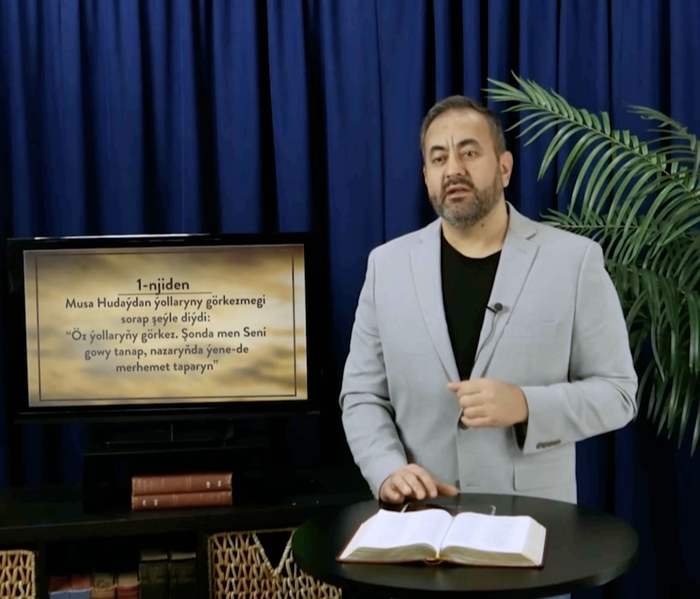
From a studio in Seattle, Shohrat Piriyev spreads the gospel to Turkmenistan and Turkmen communities in Turkey, Afghanistan, Uzbekistan, and Iran. Photo: Gospel Wave Ministry/YouTube.